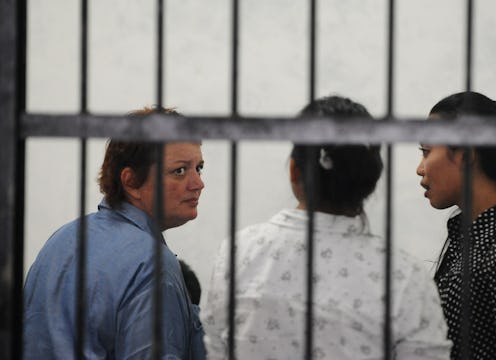News
Why Felons Should Have the Right to Vote
On Tuesday, Attorney General Eric Holder urged states to repeal laws that disenfranchise felons after they leave prison. Holder argued that the laws keep millions of Americans from exercising their most fundamental right to vote, and disproportionately impact minorities. Nearly six million Americans cannot cast ballots because of a past or current felony conviction — a number greater than the populations of 31 U.S. states. But as Holder noted, these disenfranchisement laws are not just an attack on our ideal of democratic self-governance: They also present a serious civil rights issue.
More than 38 percent of those disenfranchised are black, even though African Americans only make up 13 percent of the total U.S. population. That means one in 13 African Americans nationwide cannot vote. In Florida, Kentucky, and Virginia, that number rises to greater than one in five.
Scholars argue that at least seven elections would have turned out differently had felons been allowed to vote. A 2002 study conducted by researchers at the University of Minnesota and Northwestern found that the outcome of the 2000 presidential election “would almost certainly have been reversed.” Approximately 827,000 people were disenfranchised in Florida in 2000. In turn, President George Bush won the state, and thus the White House, by a mere 537 votes.
So, who are these disenfranchised Americans with felony convictions? They are overwhelmingly poor, they are disproportionately African American, and they are more than likely to be high-school dropouts. Combined with drug policies that incarcerate young African American men and trap the poor in a cycle of antagonistic encounters with the criminal justice system, these ex-felon disenfranchisement laws only serve to further marginalize minorities.
In his speech to a civil rights conference at George Washington University, Holder stressed the racialized legacy of our criminal justice and electoral systems, including the creation of the first felon disenfranchisement laws after Reconstruction to keep large African American populations from the ballot box:
And however well-intentioned current advocates of felony disenfranchisement may be – the reality is that these measures are, at best, profoundly outdated. At worst, these laws, with their disparate impact on minority communities, echo policies enacted during a deeply troubled period in America’s past – a time of post-Civil War repression. And they have their roots in centuries-old conceptions of justice that were too often based on exclusion, animus, and fear.
Holder has long trained his eye on civil rights' infringements still percolating within the criminal justice system. As attorney general, he's pushed to relax harsh mandatory sentences to combat the soaring incarceration rates of African American men for minor drug crimes. He is right to consider the abridgment of felons’ rights, particularly their franchise, as part and parcel of criminal-justice policies that work to create a separate class of people who legally become outcasts.
As Holder noted, 95 percent of all people incarcerated will reenter society. Combined with legal restrictions the incarcerated face when trying to reenter the workforce, it becomes clear our justice system only reinforces a segregated mentality. These laws tell individuals who have already paid their debts to society that they will never be good enough. They dishearten. They isolate. And they may even make it more likely that people will return to crime.
At the most basic level, these disenfranchisement schemes corrode our ideal of government of, for, and by the people. Scholars argue that at least seven elections would have turned out differently had felons been allowed to vote. A 2002 study conducted by researchers at the University of Minnesota and Northwestern found that the outcome of the 2000 presidential election “would almost certainly have been reversed.” Approximately 827,000 people were disenfranchised in Florida in 2000. In turn, President George Bush won the state, and thus the White House, by a mere 537 votes.
Over thirteen years later, eleven states do not automatically restore the right to vote to felons after they have completed their sentences, according to a 2013 report from The Sentencing Project. Some have implemented arduous processes for regaining the right to vote; others enforce years-long waiting periods. A further 20 states deny voting rights to felons who have already returned to their communities but still have remaining parole or probation time to serve. Although several states have begun to relax the bans on voting rights for people with previous felony convictions, the assortment of laws across the states often times confuses would-be voters and election officials alike.
Holder is the first U.S. attorney general to publicly advocate for eliminating the bans on ex-felon voting. While his words exert no legal or political force upon the states’ voting regulations, Holder’s speech could open up new ground for state legislatures or Congress to tackle the issue. Recent public opinion surveys show that the majority of Americans are in favor of returning voting rights to people who have committed felonies once they are out of prison.
As we pay closer and closer attention to new voter photo ID laws in North Carolina and Texas that will disproportionately keep minorities from the polls, Holder reminds us that we should not forget the statutes curtailing ex-felons’ voting rights that have targeted African American voters for decades.
It is past time for Congress to pass a law that would guarantee the right to vote for Americans who have served their time for felony convictions. It is past time for states to actively stand up for the unfettered right to vote for all their citizens — not just for individuals fortunate enough to escape the school-to-prison pipeline, or privileged enough to afford quality counsel.
Image: Getty Images
